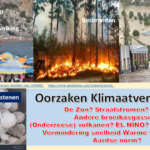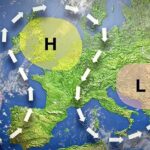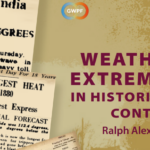De opwarmings’pauze’ of hiatus (zoals deze in het klimatologisch jargon wordt genoemd) stelt de mainstream van de klimatologische wetenschap nog steeds voor een raadsel. Extreme protagonisten van de menselijke broeikashypothese (AGW = ‘Anthropogenic Global Warming’) hebben soms de neiging de hiatus te ontkennen. Zij zien in de recente temperatuurpiek een bevestiging van hun gelijk. Maar de mainstream (en de klimaatsceptici) schrijven deze toch toe aan een kortstondig verschijnsel dat niets met CO2 heeft te maken, maar met een natuurlijke oorzaak: El Niño.
Hoe ziet de mainstream het toekomstig temperatuurverloop. Is er een kans dat de hiatus zal terugkeren en nog langer zal duren?
Ik roep in herinnering dat mainstream klimatologen als Latif en Keenlyside in 2008 reeds hebben gewezen op de mogelijkheid van een verminderde opwarming gedurende een langere periode. (Zie hier en hier.)
Maar wat denken de belangrijkste meteorologische instituten nú van het toekomstig temperatuurverloop?
Onder de titel, ‘Study: Global Warming ‘Slowdown’ Could Last Another 15 Years’, rapporteert Michael Bastasch voor de ‘Daily Caller’ daarover het volgende:
With 2016 on track to being the warmest year on record, some climate scientists and environmentalists declared the recent slowdown in global warming to be over.
But that might not be the case, according to a new study by National Oceanic and Atmospheric Administration (NOAA) scientists. They say there’s a 16 percent chance global warming could progress at a slower rate through 2020, and a 6 percent chance the slowdown could last until 2030.
“The spike in global temperatures from the 2015/2016 El Nino has caused some to declare the warming slowdown to be over,” Dr. Judith Curry, a Georgia Tech climate scientist who was not involved in the study, wrote in her blog.
“This is not necessarily the case; we will need at least another 5 years of observations to determine whether the slowdown is over and warming resumes at a pace of at least 0.2°C/decade, or whether the slowdown will continue for another decade or two,” she wrote.
Scientists have been struggling to explain why global temperature rise slowed down in the years after 1998, a period called the “slowdown” or “hiatus” in warming. It not only surprised scientists, but forced them to question the climate models used to predict future warming.
The climate warmed at about half the rate predicted by climate models since 2000, according to the NOAA study, which sought to answer the question of why the models were so far off. In the process, they suggest there’s a chance of no warming or even slight cooling in the future.
“Our analysis of model simulations suggest some conditions whereby an early 21st century global warming slowdown could potentially last much longer (to ∼2030) than is generally expected, as well as scenarios where a rapid temporary acceleration of warming might occur,” NOAA scientists wrote.
“The possibility of such behaviour in the climate system in coming decades, while not a prediction, should motivate more study of internal multidecadal climate variability and its mechanisms,” they wrote.
This isn’t the first study to look at the potential for a prolonged “slowdown” in global warming.
UK Met Office scientists released a study in 2015 claiming the probability of the slowdown lasting another five years was 25 percent. UK scientists found “the probability of a variability-driven 10-year hiatus is ~10%, but less than 1% for a 20-year hiatus.”
But that study was released before an incredibly strong El Niño warmed up the Pacific Ocean and drove up average global temperature to record levels for 2015. The naturally-occurring warming event persisted into 2016 and even had scientists freaking out over how warm it was in February.
Now, global average temperature is coming down as a relatively weak La Niña cooling event takes hold. The question on everyone’s mind is whether or not the “slowdown” will continue after El Niño’s heat fully subsides.
Lees verder hier.
Kortom, de wetenschap is er nog niet uit.
Voor mijn eerdere bijdragen over klimaat en aanverwante zaken zie hier, hier, hier, hier en hier.






Hans,
Goed dat je vertouwen hebt in de klimaatmodellen!
Dus nu ook graag een plan om de uitstoot van CO2 te verminderen
Slaat als een tang op een varken, Henk. CO2 is groeigas, gunstig voor de aarde, géén vervuiling dus!
Dit resultaat is gebaseerd op de klimaatmodellen die dus gewoon uitgaan van een opwarmend effect van CO2 (zeg maar gewoon standaard natuurkunde )?
Als je denkt dat klimaatmodellen gewoon in standaard natuurkunde kunnen worden gevat dan heb je blijkbaar geen benul van de complexiteit van die modellen en de onzekerheid die daar uit voortvloeit. Niet voor niets is er een grote spreiding in de uitkomsten van de (32) verschllende modellen. Het Russische klimaatmodel ( INM-CM4) komt het dichtst bij de gemeten waarden, maar zelfs dat kan toeval zijn want we weten niet hoe groot de natuurlijke klimaatvariabiliteit is/was.
Chris
Dat een verdubbeling van CO2 zorgt voor een opwarming zonde feedback van ca. 1,1 C is zeker standaard natuurkunde. En dat warmer meer wateramp betekend is ook al geen verrassing en dat warmer betekend dat ijs smelt ook al niet
Als het zo simpel was dan zouden de verschillende modellen niet zo ver uit elkaar liggen. De modellen hebben weinig idee hoe het wolkendek (albedo!) zich gaat gedragen. Bovendien is het waterdamp verhaal niet zo eenvoudig als jij doet voorkomen. Terwijl opwarming inderdaad meer waterdamp in de lage troposfeer brengt wordt de middle and upper troposfeer juist droger. Het net effect zou best eens een negative feedback kunnen opleveren. Zie bijvoorbeeld: http://www.drroyspencer.com/2010/09/five-reasons-why-water-vapor-feedback-might-not-be-positive/
En als dr Roy spencer daar een goede onderbouwing voor heeft moet hij. Geen blog schrijven maar een wetenschappelijke publicatie doen.
En hoe kan bijvoorbeeld een kleine forcing van de milankovich cycli zorgen voor zulke grote temperatuur sprongen zonder positieve feedback ?
Henk, heb je een onderbouwing waaruit een meetbare temperatuur invloed uit de schaarse CO2 toename volgt?
It was only a few weeks ago that we were being told about record heat and ice melt in the Arctic!
Meanwhile, all that has happened in the last couple of months is that a lot of heat has escaped from the ice free ocean and radiated into space.
http://ocean.dmi.dk/arctic/icecover.uk.php
Sorry dit was de bron:
https://notalotofpeopleknowthat.wordpress.com/2016/12/20/arctic-ice-extent-quickly-recovers-from-november-lows/
De hiatus komt in ieder geval terug in de stukjes van Hans Labohm, want die verschijnen met de regelmaat van de klok.
Maar wie de citaten in het stuk leest ziet iets opmerkelijks: er is een steeds verdergaande inflatie van het begrip. Een hiatus is eigenlijk een slowdown lezen we, en een slowdown is een situatie waarin het opwarmt met niet minder dan 0,2 graden per ‘decade’. Zo komen we er wel. Kijk nog maar eens naar deze figuur:
http://www.logboekweer.nl/Actueel/UAHtrend30y.PNG
Geen hiatus op te zien overigens. Wel een gestage opwarming. Nog geen 0,2 graden per ‘decade’, maar de kromming naar boven doet vermoeden dat dat moment nog wel eens aan gaat breken.
de ‘echte’ grafiek geeft de hiatus zeer duidelijk weer.
http://www.drroyspencer.com/latest-global-temperatures/
Het zijn allebei ‘echte’ grafieken, het is maar over hoeveel jaar je het gemiddelde uitrekent. Voor het bepalen van het klimaat (en dus ook klimaatverandering) is een periode van 30 jaar het meest geaccepteerd. Kijk de berekening even na in het excel-bestand:
http://www.logboekweer.nl/Actueel/UAH_Trend.xlsx
je liet zelf een grafiek zien van 7 jaar.
“je liet zelf een grafiek zien van 7 jaar.”
Het zijn opeenvolgende gemiddelden van periodes van 30 jaar. De eerste periode is dec 1978 – nov 2008. De laatste periode is dec. 1986 – nov. 2016.
Precies, een hiatus van 19 jaar.
http://www.woodfortrees.org/plot/uah6/from:1978/mean:12/plot/uah6/from:1997/to:2016/trend
Bart
Wat een geweldig nauwkeurige meting lijkt dit te zijn. Hoe groot zijn de meetfouten?
En sinds de laatste kleine ijstijd warmt het al op kun je aangeven wat volgens jouw de oorzaak is van deze zeer geringe opwarming?
Ook kun je veel vermoeden maar zo’n kromme zegt duidelijk helemaal niets en wat je vermoedens betreft ik heb sterk het idee dat daar een fors stukje selectiviteit in de beoordeling van dit weinig zeggende plaatje zit.
Voor vragen over de nauwkeurigheid kun je het beste terecht bij dhr. R. Spencer, Huntsville, Alabama US. De vorige versie van UAH liet een iets sterkere stijging zien. De gegevens van NASA (metingen aan de grond) nog wat meer, maar alles onder de 0,2 graden/10 jaar.
Zo heer Vreeken, nu uw antwoord gaarne!!!
Punt blijft dat de metingen uit de pas lopen met de modellen, dat het IPCC bij handopsteken een suggestie geeft van een betrouwbaarheidsniveau wat het niet is, en tot slot een verloop na 1998 die met behulp van Woodfortrees dalend, gelijk of stijgend is. In elk geval is er volop discussie over en dit is een duidelijk signaal dat er dingen gebeuren die niet in het mainstream-straatje passen. Het is ook lastig staand te houden dat een meetreeks van 1980 tot 1998, amper 20 jaar, waarin temperatuurstijging en substantiële CO2-stijging positief correleerden, tot zulke vergaande conclusies over wereldwijde rampen die ons sinds die tijd worden voorgehouden, het vertikken op te treden. Die AGW-hypothese rammelt dus, en dit is de kern van dit artikel. Vooralsnog, gezien op de tijdschaal sinds het eind van de grote ijstijd, moet de opwarming logischerwijs gezien worden als herstel na de Kleine IJstijd. Het zou wel al te dol worden als dit herstel na pakweg 1800 nu opeens uitsluitend door menselijke invloed zou komen.
Jeroen,
Je hebt natuurlijk niet alleen het blog gelezen maar ook de onderliggende studie en gelezen dat deze resultaten komen uit een studie die vooral is gebaseerd op klimaatmodellen ……
En alle wft zijn vanaf 1998 natuurlijk gewoon stijgend en natuurlijk is 1998 een mega cherrypik (maar dat doen “sceptici” natuurlijk nooit !
@Hetzler:
“Het zou wel al te dol worden als dit herstel na pakweg 1800 nu opeens uitsluitend door menselijke invloed zou komen.”
Klimaatschommelingen zijn er natuurlijk altijd geweest. Wat dat betreft ligt het niet voor de hand dat natuurlijke invloeden nu niet meer meespelen. Maar dat zegt ook niemand. Het is wel zo dat we in recente tijden meer zicht hebben op alle factoren die een rol spelen. Natuurlijke factoren, zoals de activiteit van de zon en van vulkanen. En onnatuurlijke factoren zoals de hoeveelheid broeikasgassen, roetdeeltjes en vliegtuigstrepen.
De interpretatie van het effect van de verschillende factoren wordt bemoeilijkt door het grote vertragende effect van de warmteuitwisseling met de oceaan. Die verloop ook nog eens met grote sprongen.
Er is geen constante opgaande trend vanaf de ‘kleine ijstijd’, zie onderstaande figuur. Halverwege de vorige eeuw stagneert het een tijd.
http://www.logboekweer.nl/Actueel/NASAtrend30y.PNG
Dit komt goed overeen met de gedachte dat de opwarming in de 19e eeuw vooral kwam door de toenemende activiteit van de zon, en de opwarming vanaf de tweede helft van de 20e eeuw vooral door broeikasgassen.
@Henk U heeft het helemaal begrepen. Er is dus wel discussie. Onlangs beweerde u het tegenovergestelde ter verdediging van de positie van de rechter in de Urgenda-zaak.
Nope ,
Over de basis is helemaal geen discussie. Zeker niet voor de zak tussen Urgenda en de staat.
En er is zeker geen enkele wetenschappelijke publicatie die het standpunt Hetzler ondersteund nl. De AGW hypothese is weerlegd
Zak? Schelden doen we hier niet Henk. Alleen kritische argumenten uitwisselen.
Henk
Dan even de vraag stellen die jij niet stelt.
Is er ergens in de wereld sluitend bewijs te vinden van de juistheid van “de AGW hypothese” ?
Henk hier de praktijk.
Van alle broeikasgassen in de atm,
waaronder meer dan 40.000 ppm waterdamp en 400 ppm co2 is het aandeel van co2 in verhouding klein te noemen.
https://nl.wikipedia.org/wiki/Broeikasgas
Sinds het begin van de industriële revolutie is de toename niet meer dan 120 ppm.
Een deel van deze toename is van natuurlijke oorsprong en een klein deel word door mensen in de lucht gebracht.
Dat deel wat door mensen is geproduceerd is zeker minder dan 100 ppm. afgezet tegen meer dan 40.000 ppm waterdamp stelt dat niet echt veel voor.
Beste Henk graag een inhoudelijke reactie.
Hugo,
100% van de toename is antropogeen.
Durf je eens af te vragen wat de hoeveelheid waterdamp is op 2 km hoogte
Hugo,
Sluitend bewijs is voor wiskunde en niet voor natuurkunde
Nostradamus .
Hij kon voorspellen.
De diverse klimaatmodellen moeten zich nog bewijzen.
Wat mij altijd mateloos verwonderd is die discussie over tienden en honderdsten van graden. Jongens waar zijn jullie toch mee bezig. Neem bijvoorbeeld dit:
http://www.clim-past.net/11/931/2015/cp-11-931-2015.pdf
“….late in the last interglacial period, at 123 ka, SASM rainfall decreased, perhaps in response to a decrease in temperature and ice cover in the high northern latitudes and associated changes in atmospheric circulation. Then at 120.8 ka, a rapid increase in SASM rainfall marks the end of the last interglacial. After a more gradual increase between 120 and 117 ka, a second abrupt increase occurs at 117 ka. This pattern of change is mirrored to a remarkable degree by changes in the East Asian Monsoon. It is interpreted to reflect both a long-term gradual response of the monsoons to orbitally driven insolation changes and to rapid changes in Northern Hemisphere ice volume and temperature. Both monsoon systems are close to their full glacial conditions by 117 ka, before any significant decrease in atmospheric CO2.
Simpel vertaald: het klimaat ging als een razende wildeman tekeer terwijl CO2 er geen zaak mee te maken had (niet vloeken he? ;)
Dus de klimaat gevoeligheid is hoog en niet laag
Henk
Henk je komt met een *** verhaal zonder enige onderbouwing en wat bewijs betreft
correlatie binnen het 95% gebied is meer dan voldoende.
Geef nu eens antwoord op de vraag in plaats van te zwetsen.
Hugo,
Ik kan niet meer reageren vanaf mijn computer (bedankt moderatie) gied je net doen en zoeken hoe het allemaal werkt en niet denken dat jij het beter begrepen hebt dan alle experts
Henk
omschrijf “experts”
Al die mensen die gewoon door hebben dat het verdubbelen van de hoeveelheid CO2 een gevolg heeft dat er een extra forcing is van 3,5 W/m2 wat weer resulteert in een opwarming van ca. 1,2 C.
Dit alles zonder feedback natuurlijk.
Alles geen enkel probleem en geen enkele wetenschappelijke discussie
Geen enkele wetenschappelijke discussie: het klimaat is stuk en moet gerepareerd worden.
Mooie uitspraak Chemical, kan je die ook onderbouwen?
Waar is het bewijs, of uit welk atmosferisch eoxperiment volgt dit Henk?
Hoe kom je aan die forcing Henk? En aan die opwarming?
Ik neem aan dat de forcing ongeveer nul is indien de temperatuur verandering vooraf gaat aan de CO2 verandering, zoals blijkt uit paleodata en ook huidige data.
Erik,
Je laat weer eens blijken dat je er totaal geen verstand van hebt. De stijging van het CO2 nivo is 100% antropogeen. En de forcing dus ook.
Henk, je draait om mijn vragen heen. Geef nou eens aan hoe je aan die 3,5 watt per m^2 komt? En waar is het experiment dat dit een temperatuur verhoging van 1,2 graden geeft. En gaarne commentaar dat eerst de temp verandert en daarna pas CO2 .
Ik word af en toe gestoord van hoe een ieder van jullie op elkaar reageren, wanneer beantwoord een ieder eens elkaars vraag om te beginnen?
Het blog is een prima methode om zaken aan te kaarten, maar nadat ik met er een tig tijd mee bezig heb gehouden lijkt het een soort onderonsje te zijn in een besloten samenleving die iets van doen heeft met klimaatverandering. Miscchien kan het blog in dat opzicht ook een spreken naar de goegemeente, die ook moet weten hoe een en ander in elkaar steekt om uberhaupt een mening te kunnen hebben op deze specialistische materie. Jullie zijn alle ook (mede)verantwoordelijk voor een goede opinie vorming als het de gemiddelde Nederlander om te beginnen betreft. Onderonsjes zijn deels egootjes, daar kan de rest van de gemiddelde Nederlander sowieso niets mee.
Zie mijn spelfouten, neem die in moderatie ook even mee, bedankt alvast ;)
Vreemd blog, een regel komt wel door, een tekst niet haha…
Zonodig splits ik mijn reactie wel op in meerdere enkele regels als vele regels in een keer niet door de ballotage komen ;)
Henk,
Standaard natuurkunde of zoiets.